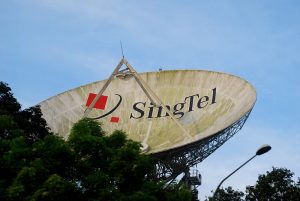In April, a major Thai energy company made moves to expand its role in the country’s telecom sector. As reported by Reuters: “Gulf Energy Development Thailand’s biggest power producer, run by billionaire Sarath Ratanavadi, offered a $5.4 billion bid on Monday for Intouch Holdings, which controls the country’s top mobile phone operator AIS.” The Bangkok Post, citing industry sources, later reported that “Gulf is close to the government’s key figures as well as Digital Economy and Society (DES) Minister Chaiwut Thanakamanusorn,” and that the company was looking to become a major player in Thailand’s telecom industry.
But there was one obstacle. The deal needed sign-off from Singtel, Singapore’s top telecom company which is majority owned by sovereign wealth fund Temasek. According to the Business Times, Singtel has a 23.3 percent stake in AIS, and 21.2 percent ownership of AIS’ controlling shareholder Intouch Holdings. At the end of July, Singtel indicated it would not accept Gulf’s offer on the grounds that it was under-valued and Intouch is a strategic asset. For now, Gulf Energy’s ambitions in the Thai telecom market will have to wait, or proceed via a different route.
Why did Singtel pass on the offer? Well, the obvious reason is because they didn’t think it represented fair value. But it’s also worth considering the strategic implications of Singtel’s holdings in the region. Up until 2000, Singtel had a monopoly on Singapore’s domestic telecom industry and in the 1990s, it started using these monopoly profits to aggressively expand its regional footprint. Over several years it acquired stakes in Thailand’s AIS, India’s Bharti Airtel, the Philippines’ Globe, and Indonesia’s Telkomsel. It purchased Australia’s Optus outright in 2001.
These investments have been very profitable. According to Singtel’s 2020 financial statement, AIS alone with its dominant position in the Thai market netted SG $1.3 billion in profit on $8 billion in revenue, and paid a $212 million dividend to Singtel. In total, Singtel derived SG $1.4 billion in cash dividends from all of its joint ventures and associates in 2020. So Singtel, and its holdings in the region, make a lot of money. But they are also in some measure a projection of Singaporean soft power through outward investment.
National telecom industries and their ownership structures often go beyond simple financial calculus and can become very political. For instance, in 2007, Indonesian regulators ruled that Temasek could not hold indirect stakes in two domestic telecom companies at the same time: Singtel owned shares in Telkomsel, and wholly owned Temasek subsidiary ST Telemedia held shares in Indosat. Ultimately, ST Telemedia was forced to divest its holdings. Gulf Energy’s play for Intouch and AIS may be driven by a similar nationalist impulse to regain control over a politically sensitive industry.
And there is likewise an element of geopolitics and strategy in Singtel’s decision to hold onto them for the long-term. When it first began expanding outside of Singapore, Singtel’s ambitions were sometimes thwarted or downplayed. As this 20-year-old piece from the New York Times shows, investors felt at the time that Singtel CEO Lee Hsien Yang (the son of Lee Kuan Yew and brother of current Prime Minister Lee Hsien Loong) overpaid for Optus. The article gives the impression that, at least in some quarters, Singtel was viewed back then as just another inefficient state-owned company being propped up by government largess and family connections, and that it would struggle to compete on equal footing with global rivals.
But Singtel’s current position as a well-run and profitable regional powerhouse has proven it can compete globally, and vindicated Singapore’s outward-looking investment strategy. So is there a price at which it would be willing to give up an asset like AIS, which not only pays out steady dividends but also helps to project Singaporean soft power by burnishing its image as a global financial hub and major regional investor? There might be, but it’s probably going to come at a premium.
































